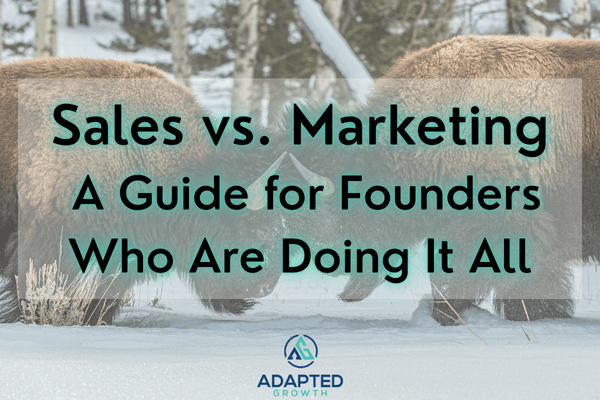One of the most fundamental parts of scaling your business is knowing when and how to hire salespeople. You want to do it right the first time, but it’s a daunting task if you’ve never done it before.
If you’re like many entrepreneurs, you or your small team are probably wearing a lot of hats, including handling the sales role while managing other aspects of the business. Eventually, you’ll want a dedicated salesperson so that you can focus on growing.
But when is it time? And how do you do it right without hiring people who won’t do a good job?
Fortunately, with the right process, you’ll quickly learn how to hire salespeople who will maintain your values while bringing your company more success and revenue.
How to Know if You’re Ready to Hire Salespeople
Before you begin writing a job description or interviewing candidates, it is essential to ask yourself a few key questions. First and most importantly:
Are you truly ready to bring on a salesperson, or are you hoping they’ll solve a problem you haven’t yet defined?
Here are a few questions to help you decide:
✅ Have you sold your offer yourself, more than once?
If you haven’t sold your own product or service, a new hire will have no roadmap. Without proof of concept or market viability, you may not even have a product or service that people need. Without your experience selling your offer, even the best salespeople will struggle to succeed for you.
✅ Do you understand your buyers and how they make decisions?
Knowing your typical buyer’s journey, pain points, and objections is the first step in building a sales process. If you don’t know what your target market needs, it’s too early to bring in a salesperson. Without at least a foundation for messaging, a salesperson can’t sell what’s not clearly defined.
✅ Do you have a sales process, however simple, that you can teach?
As with messaging, a sales process can and should evolve. But even a rough script or a step-by-step outline gives your new hire a place to start. Without it, you’re asking them to build the plane while flying it.
✅ Can you invest time in training and supporting them?
Hiring isn’t a “set it and forget it” move. Salespeople need feedback, coaching, and a runway to ramp up, even if they are experienced. If you’re too busy or lack any training know-how, consider waiting or outsourcing your coaching before hiring.
✅ Are you financially prepared for the investment?
A good salesperson may need at least three to six months to ramp up before consistently closing deals, so if you’re looking for a quick revenue boost, hiring might not be the right answer. Plus, you may need to cover expenses such as headhunting, outside training or training materials, additional resources and technology for new employees, and other unplanned costs. Hiring isn’t cheap, so make sure you have the budget for it first.
✅ Do you have a plan in place for compensating your salespeople?
It’s also vital to know what kind of pay structure you can afford, especially during the onboarding and ramp-up phase. Commission-only may sound lucrative for you and motivational for salespeople, but it’s not always as beneficial as you’d think. In addition to pay, can you offer benefits, such as health insurance and paid sick leave? If not, you may struggle to find salespeople who will stick around for the long haul.
If you can answer “yes,” even hesitantly, to these questions, you’re ready to think seriously about hiring.

Why Hiring Salespeople Can Be So Tricky
Hiring salespeople isn’t just about filling a seat. It’s about finding the right person to represent your vision, your values, and your product while building trust with your customers.
Most founders underestimate just how different sales roles can be. They assume every salesperson is a “closer,” when in reality:
- Some thrive on prospecting but struggle with closing.
- Some excel at consultative selling but avoid conflict.
- Some love high-volume outreach but can’t handle long sales cycles.
Plus, the hunter-type salesperson that many business owners believe they need may be so focused on closing deals that they bring in bad clients, disregard your values, and harm the culture and camaraderie of your team.
Hiring without understanding these differences is a recipe for churn, or worse, developing a bad reputation due to oversold promises and unhappy clients.
What Makes a Salesperson Successful?
Great salespeople aren’t born, they’re developed in the right environment. Knowing how to hire salespeople starts with knowing what to look for (and nurture, after hiring) before the interviews start:
- Coachability
Your first hire should be open to learning everything about your product, market, and processes. - Self-awareness
Top performers are aware of both their strengths and weaknesses. Tools like the DiSC Personality Assessment can help you identify communication styles and potential challenges before and after you hire. - Adaptability
Startups can be chaotic, and both processes and markets will shift as you grow. You need someone who can roll with the punches and adapt well to change. - Accountability
Look for people who take ownership of their outcomes, not just their activities. You want a partner who is invested in helping your clients, not just an employee doing the bare minimum.

How to Hire Salespeople Who Fit
Here’s how to bring on the right person the first time:
🔹 Start with Your Sales Process
Even if it’s simple, document the steps you take to sell. What’s your outreach strategy? How do you qualify leads? How do you handle objections? Without this, you’re asking your hire to guess.
🔹 Use Personality Assessments in the Workplace
The DiSC Personality Assessment helps you understand how your candidate communicates under pressure. For example:
- A high D might push too hard, too soon.
- A high I might skip details that matter.
- A high S might struggle to challenge a prospect’s assumptions.
- A high C might get stuck in analysis.
Knowing this lets you coach both current employees and future hires more effectively and avoid misunderstandings later.
🔹 Look for Culture Add, Not Just Culture Fit
Your first sales hire should share your values but also bring something new to the table. Perhaps they’ve been successful in your industry before. Maybe they’ve overcome similar challenges and can help you grow.
Understanding these components will give you a better understanding of how to hire salespeople with an interview that will help uncover your best future employees.

How to Interview Salespeople
Many managers try to find that mythical perfect salesperson by using the “sell me this pen” role play. It makes sense; you want to know how well they can sell.
But candidly, it’s a waste of time. Either salespeople know it’s coming and they’ve rehearsed their script, or it disrupts what could otherwise reveal more important traits, such as accountability and coachability.
Other standard interview questions may not be suitable for interviewing a salesperson.
“Tell me about a time you had a conflict at work and what you did to get past it.”
That could (arguably) be an excellent question for a future manager or a customer service role. However, it doesn’t really tell you how well a person conducts sales conversations or how much they care about helping people find the right solution.
Instead of the same tired interview questions, surprise your candidates with something new.
Ask Better Questions to Hire Better Salespeople
Asking a potential salesperson how they plan and work through processes is more impactful than asking how they resolve conflicts.
Ask them:
- How they plan their day/week/month.
- What process they have to prioritize their leads, territory, and inherited book of business.
- How they incorporate a new sales process into their habits.
These questions will highlight how vital planning and strategies are to them and how flexible they are in handling something new.
Hopefully, you’ve created and documented a successful process for acquiring and closing leads. So, you want to ensure that the person you hire can adopt and eventually evolve those processes you put so much work into creating.
When learning how to hire salespeople, being able to pinpoint people who are coachable and adaptable is one of the biggest hurdles.

Roleplaying Sales Situations
Next, roleplaying sales situations can be beneficial because you want to get an idea of how they sell.
But forget the “sell me this pen” scenario.
Roleplay a sales conversation that happens during the discovery phase, not the pitch. Find out if they know how to ask questions that will uncover their prospects’ needs.
Anybody can pitch features and benefits. But asking great discovery questions is what separates the “getting by” salespeople from the truly successful.
After that, ask them to roleplay a situation where you say no to the sale. See how they respond. Do they get flustered and don’t know how to proceed? Or do they accept it and respond with good follow-up questions?
This can give you an idea of whether they’re the kind of salesperson who looks for only the best-fitting clients or the type that will try to close every sale, regardless of how good the fit is. It will also let you know how they handle conflict in a sales situation.
Pay Attention to the Details
While asking these questions and going through the roleplays, pay special attention to their soft skills.
Being a successful salesperson requires confidence, a healthy sales mindset, and effective communication skills. They must gain trust and rapport, sometimes quickly, to create lasting relationships with ideal clients while quickly and gently disqualifying bad leads.
Above all else, listen! Pay attention to the questions they ask. Are they just asking questions about pay and vacation? They might just be looking for any job, whether or not it’s a good fit.
The best sales candidates will ask specific questions about your company, values, expectations, and management style. The questions they ask will show how dedicated they are to staying and building a career where they fit in.
It may also show that they’ve done their homework about your company before the interview.
Those types of salespeople are usually the ones you want to hire.
Assessing Doesn’t End After the First Interview
If they knock that first interview out of the park, the next step should be to have them take an assessment, preferably DISC.
Even if you’re already pretty certain where they land, a personality assessment will give you more concrete information about their strengths, challenges, and communication style.
However, you shouldn’t use assessments to disqualify potential salespeople outright. Any personality type can sell well if they meet the other criteria you are looking for.
The benefits of personality assessment include making onboarding and orientation more productive, as well as helping you find the best ways to motivate and communicate with team members when working together.

Knowing How to Hire Salespeople Pays Off!
Hiring your first salesperson is a milestone—one that can accelerate growth or create more headaches.
So, before you jump in, first:
✅ Define your own sales process.
✅ Understand who your ideal clients are and what motivates them.
✅ Utilize tools like the DiSC Personality Assessment to improve your communication with and understanding of others.
✅ Learn how to conduct more productive and enticing interviews that give you a better understanding of who your candidates really are.
Sales isn’t just about talent. It’s about the environment you create, the expectations you set, and the coaching you provide. That’s why knowing how to hire salespeople is only the first step in fostering and leading a happy and successful sales team.
But when you get that crucial step right, you’re not just hiring a salesperson. You’re building a sales engine.
If you need help searching for, hiring, or training new salespeople,
Let’s talk!









